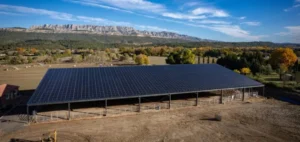Aker Offshore and Ocean Winds have collaborated with the University of Strathclyde to create an immersive presentation aimed at attracting investors.
Aker Offshore prepares a 6 GW project
Both companies utilize WindFloat technology to develop their wind platforms. This technology is engineered by Principle Power Inc, in which both companies hold a majority stake. The location for the future production facility has yet to be determined.
Their goal is to address energy demands in the UK and globally. The floating wind industry is anticipated to generate thousands of jobs in Scotland. Both companies have submitted bids for platform installations in the Moray Firth, located in north-east Scotland. Together, they could deliver a combined capacity of 6 GW. Aker Offshore’s project implementations are projected to create nearly 5,000 jobs and 200 apprenticeships. These jobs would be distributed across the production facility and various offshore wind farm sites.
Positioning Scotland as a leader in offshore wind energy
Approximately 80% of exploitable wind resources are found in marine areas with depths exceeding 60 meters, making fixed installations unsuitable for these regions.
Floating offshore wind presents a strategic opportunity for Scotland’s energy transition, serving as a sustainable alternative to oil and gas.
Dan Finch, Managing Director of Ocean Winds in the UK, aims to position Scotland as “the global leader in floating wind power.” He intends to deploy in the North Sea the same installations that have been successfully tested in the Moray Firth.
Sian Lloyd-Rees, Managing Director of Aker Offshore Wind in the UK, is focused on securing investment from producers in Scotland.
Cian Conroy, Business Development Director for Northern Europe at Principle Power Inc., supports the ambitions of both companies. According to him, the adoption of WindFloat technology is pivotal to advancing the decarbonization of the UK’s energy sector.






















